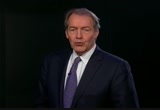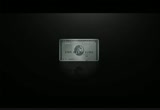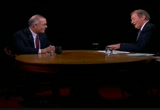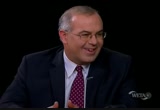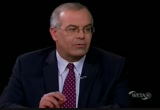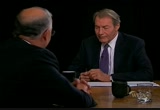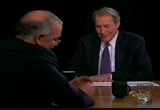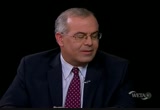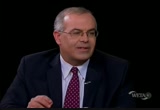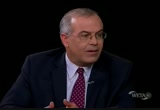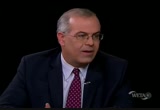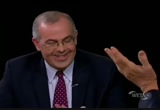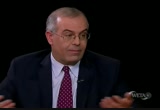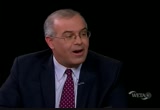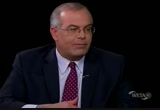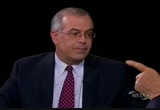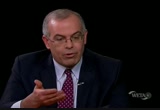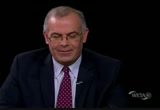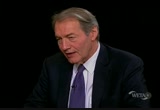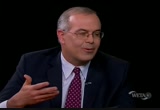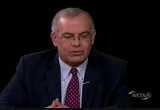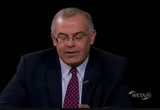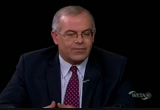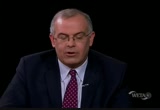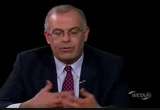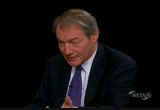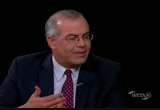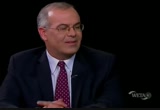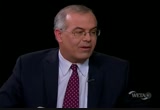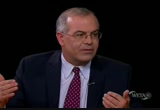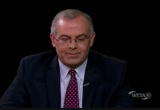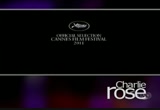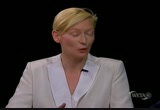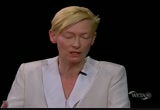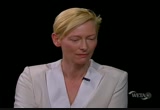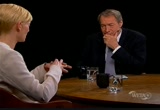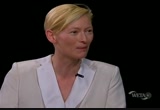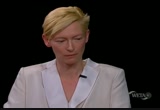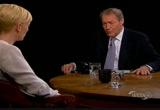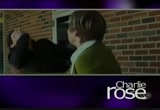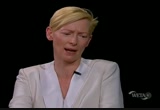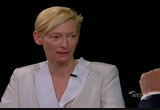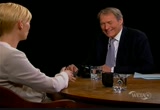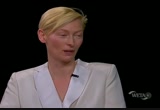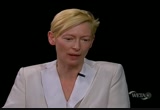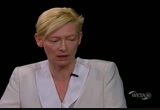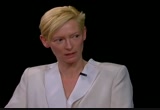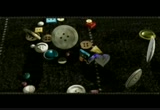tv Charlie Rose PBS February 2, 2012 12:00pm-1:00pm EST
12:00 pm
>> rose: welcome to our program. we begin this evening with a conversation with david brooks, the columnist in for the "new york times." >> i do not think we're in decline. the cultural d.n.a. of the country is still very strong. the young people very impressive young people. ifou look at the social indicators that went back in the '60s, '70s and '80s, they're heading in the right direction. enage pregnancy, s down, teenage suice is down. domestic violence is down, crime is drown. vorce rates for people under 30 are lower an people over 3 after the same number of years of marriage. incredibly wholesome generation. >> rose: w conclude this evening with a conversation with actress tilda swinton. her new film is called "we need to talk about kevin." >> i never intended to be an
12:01 pm
actor and i did slide it into when i stopped writing and it occurs to me that maybe it has a relation. what i love about the cinema is that introspection. is what i love about poetry also which is that feeling of a kind of inar tick lasy and looking far way for saying unsayable things and knowing that you're going to fail and that communication is kind of impossible but you're going to try anyway. i think's a relationship for me about being a performer. >> rose: david brooks and tilda swinton next.
12:03 pm
>> rose: tonight we look at mitt romney'sesounding win inhe florida primary last night. he won by a wide margin with 46% the vote. this brings the massachusetts governor one step closer to becoming the republican nominee. newt gingrich who won the south carolina primary finished second despite the loss, the former house speaker said he will continue to fight for the nomination. joining she david brooks, a column nyse for the "new york times," i'm pleased to have him back on this pgram. welcome. >> good to be back. >> rose: so good to have you at the table. ere are we in this presidential race and ask... i asked governor romney this morning is it his to lose? >> i sort of thought that for six months. i hate to rain on the nervous tension that surrounds on this race but i feel like if you have one plausible candidate that guy is probably going to win. i basically think gingrich is fun to watch. it's going to befun to watch in the next couple weeks. he'll doubledown on saul.
12:04 pm
is in florida people used to say "i played bingo with saul in florida, what's wrong with him?" so he'll continue and why shouldn't he? mitt romney can stumble and what does newt have to do? what else. i assu he'll continue on. the one exception is if his do know decides "you've got to know when to hold them, know when to fold them." and then it becomes problematic. >> rose: are serpa-- this y be obvious-- destructive to politics or simply an expression of individual freedom? >> i think they're destructive. i have a somewhat contrarian-- especially for journalist-- view of money in politics. i think it has a role but a limited role in shaping elections. so for example the people who voted in florida there n 2011, all these early voters, were more pro-romney than the people
12:05 pm
who voted on election day even though romney had unleashed this incredible garage of dollars against newt gingrich. so the dollars may have had some effect but i think it's a minimal effect. i think that's generally true. the dollars matter when you've already persuaded people. but rick perry had all the money in the world and the dollars didn't seem to matter. in iowa, rick santorum spent 85 cents per vote. rick perry spent hundreds of dollars per vote. so i'm not a huge believer that dollars affect elections. dollars do affect politics. they do affect washington because politicians have a tremendous faith in dollars. >> rose: and lobbyists are effective in terms of legislation and rule making. >> and what you can talk about and what's impermissible to talk about. my problem with the superpacs is that they weaken the party. shdon adeleson and his wife can give $10 million to newt but you can only give a thousand bucks to a candidate. so we've defunded the parties and candidates but encouraged unlimited fundingor everything else. so that's stupid.
12:06 pm
>> reporter: campaign finance reform has had a life and a death. mccain tried for a whi to get something done. >> my view is it's really hard, like anything else that's complicated, it's hard to regulate it. so a dumb simple rule is best. we either go with public financing or the transparency regime and say you can give but everybodhas to know everything. so those two, dumb and stupid, options strike me as better than the fine tuning we're trying to do which nerorks because the money gets rounded. >> rose: do you believe that when they write the history of this campaign based on what we know now and might anticipate in the general election that debates will be a primary story of the politics of 2012. >> yeah and i'm not sure it will ever happen again. but the candidates are crazy to want it, especially front-runners. i can see why the energy mall candidates would want it. they've been great theater, great to watch. the interesting thing to me is... and i think this was gingrich's problem. he says "he's a massachusetts
12:07 pm
modera." but what exact policy difference do they have? has gingrich he's been able to say "he he's a moderate and here's why i'm more conservative on health care and taxes"? he hasn't said that at all. so the debate is about the testosterone levels of candidates on the various nights. some nights newt gets to attack juan williams, some night he is get to attack john king so he goes after the elite media i'd watch out if i were you. >> rose: unlike a columnist in for the "new york times." not my little show here. >> newt can't finde. he'll never find me. >> at a conference. >> traveling over to davos. >> rose: go ahead. >> and so he never he never established a substantive disagreement with romney. we used to have campaigns where it was rockefeller versus reagan and there was a clear difference. now because our parties aren't
12:08 pm
like that anymore. our parties are ideologically cohesive and relatively... intellectually undivorce we don't have parties like that. >> rose: that's bad? >> i think it's bad. they become much more insular. and the republicans have no enactment strategy. okay you have an idea on medicare reform. i think it's a good what romney has and tax reform, you want to simplify the code. given a divided government how do you enactment? >> rose: you mean a political strategy to get through a congress that is at each other's throat? >> assuming the democratic party doesn't vanish how are you going to do is this? assuming it's uopular, medicare reform, how are you going to do this? i have core problems with each party. that's my core problem with the publican party, they have big plans, no enenactment strategy and some are crazy and irresponsible. my problem with obama is nothing big so those of us in my business turn on our phones and we read something called "political play book" by a guy
12:09 pm
named mike allen. so the headline this morning is "white house unleashs a digital textbook initiative." so we've got a trillion dollars in debt, we're potentially facing national decline. obama's working on digital textbooks? maybe i'm for him, i don't care. but it's clintonism. it's... when bill clinton was doing school uniforms, doing all these microissues. >> rose: which he didn't mention in the state of the union. >> it showed he cared about the right issues. my favorite one in the clinton years was no handguns for deadbeat dads which was like a two-ifer. >> i'm against handguns and deadbeat dads. so it was a perfect two-fer, but these are not worthy of pridential attention so the democrats seem to have adopted a political stragy that says no more heavy lifting.
12:10 pm
we'll show we care with these micro targets and then attack romney. in a country hungary for change, i'm dubious. >> rose: does either candidate have the likely nominees? one hand, the president, the her hand, mitt romney. do they have in the their d.n.a. to be bold? >> obama was bold when he first got out of... >> rose: health care would be bold. >> stimulus, energy. bob woodward counted it up. it was like 630 initiatives in nine weeks. >> rose: but were they bold? >> health care was bold. i think he was bold in the beginning. >> maybe bold has to be defined by being effective. alst by definition and many people advised me including his chief of staff. emanuel said don't do it this year, not the good time. wait. >> we lose massachusetts to scott brown, he still doubles down on it. that's bold. and so why... i the state of the union and so far the agenda for the second term, why so
12:11 pm
little. is it just a political strategy no no more injury to us, just focus on romney? is it a psychological thing? we were scarred by health care. we don't want to... we're not ready for that again. or is it an intellectual thing, an honest intellectual thing where they think tax reform which would be a big thing just wouldn't get you that much. i've heard them make that case. i think it would get us much and one thing i know presint believes in is is making government simpler and more transparent so people trust it again. you're a democrat you can't get anything done for decades unless people trust government a little more and i know the president is very actited by this idea so i think tax reform is a key. they don't. >> rose: how do the think they can make the case that government has to be simpler and more accessible? how will they make that case? >> they think it's sufficient to have a rule where the senate has to vote in 90 days after a presidenti appointment which it's... again, it's a good idea. a small idea.
12:12 pm
but it's a good idea. they talk about reorganizing the department of commerce and some other sort of small business administration type agencies to put them all together and make them more efficient. i doubt americans are going to say, hey, i tru government now that opec is part of the small business administration. so small ideas with good impulse. >> rose: tell me five bold ideas you would like to see debated in the upcoming presidential election which will have consequences for who we are. >> i only have to do... i only had three? i have to do five? >> rose: okay, three. >> tax reform is a growth agenda and it's that transparency where people don't feel okay, all the rich people are getting the benefits. tax reform is one. >> rose: the debate oubt to be how to make the system more efficient, how to generate revenue and be fair? >> right. two is entitlement reform, medicare. we don't know how to mix medicare but we can try other things at the same time that are in omacare at the sametime.
12:13 pm
i think family policy is essential. >> rose: what does that mean? >> i think we have 40% of kids in this country born out of wedlock. the effects of that on average-- not for every kid born out of wedlock-- but on arage the affects of that a so powerful that it means that 30 years from now inequality ll be worse than it is right now. these effects are just huge, i don't care what we do with chart schools, you won't counteract that effect of family breakdown. so family... go ahead. >> quick thing on family policy because i care about it. it involves some conservative sounding ideas, getting people to get married before they have kids, just a social norm. some liberal policies. you've got to make men marriageable by giving them incomes. earned income tax credit, wage subsidies or else no one wants to marry a guy if he has no income.
12:14 pm
early childhood education. i don't know if that counts as four. >> rose: what's the big debate there? >> there's no debate. nobody wants to do anything about it. >> rose: because? >> because the big lobbying guns aren't k-12. the early childhood people don't have lobbying guns and the prestige is in k-12 and higher ed. >> and that affects k-12 early childhood development. >> and if you go to senators or congressmen and tell them about early childhood education they nod patron patronizingly and they think "that's a warm puppy." >> rose: how about foreign policy? >> i think we have a reasonably daisuke... you know, we have problems in iran. the one final issue i would say is metro air gras area clustering which sounds weird. but why is america really rich? it's not because whave natural resources it's because we're
12:15 pm
really good at forming networks. formg a silicon valley where you get combinations of people feeding off each other. so we should have policies to create metro areas. >> rose: why do you need that? >> some of that is infrastrture and some of that comes up automatally. you're right. silicon valley... >> exactly right. >> rose: or... well, the research triangle has some health impetus. >> there's a guy named josh learner who studies this and he makes a distinction between table setting policies and industrial policies. table setting is just giving the entrepreneurs the basic ground works, intellectual property rights, infrastructure, basic research. you're not trying to do solyndra i don't think government is smart enough to do that. but you can set the table, right. and you can have policies for a metrarea that encourages cross fertilization. >> that's an interesting question because it leads sbe this big idea about government and the role ofoverent.
12:16 pm
can you benign in a way that it will peel beyond the rhetoric of mitt romney, which is the way he likes to talk? >> again, we're entering the realm of my fantasy world. >> rose: let's go there. i like fantasy world. >> you can't have a simply repuican policy because they're good at liberating the market. they're bad at building up human skills. the democratic policies are good at building up human skills but i think are insufficiently good at liberating the market to create more xep oep competition. >> rose: so liberating the market is less regulations around all kind of markets and building up skills having to do with job training and things likehat? >> and a person's ability to contribute to the economy. so i would say instead of doing column "a" and column "b" instead of triangulateing into the mushy middle you take the extreme of column a which is a simpleax vote and less streamline regulation and the best of column b which is job training and basic research and infrastructure and you them both at once. >> do you think you represent in
12:17 pm
terms of your beliefs and writings the common sense center? >> it's not is center because it's taking the best of the outsides but i do think i represent a... i'm one of... i think a lot of people, 30% or 40% of americans... and it was interesting in the florida exit polling if you looked at the... they asked very good quesons in the etolling. and they asked people where do you stand on abortion? where do you stand on other issues? taxes. the voters were w more diverse than the candidates so even on pro-life i think only 21% of republican primary voters in florida think abortion should be illegal in all circumstances and a good 40% think it should be legal so that's a diversity of opinion and that's representative on tax policies and other things that you wouldn't know. >> back to mitt romney. will he be able to with victory coalesce the conservatives around him in the tea party because all of a sudden
12:18 pm
electability will have a different meaning? >> yeah, and i think when you talk to professional politicians about the last couple weeks what you hear them say is "we didn't know if he had it in him and he had a bad week. there are politicians that have had d weeks and how you respond to your bad week and what they saw romney do is say "i could lose. that's not going to happen. i'll do whatever i need do." >> rose: i'll do whatever i need do. >> and ts is a story that politicians talk... i shouldn't repeat it because people want to know how politicians really talk. one politician says to romney you're in a corner you have a bottle in your hand, are you going to break the bottle and slice the guy's face or not? i don't like that kind of talk but that's how they talk and in the viewof community, professional politicians, he did that. >> i would only add to that the following sort of preface.
12:19 pm
i would basically say how bad do you want to be president? >> this is a separate... i don't want to tar romney. this was somebody who ran long ago. someone who ran for president and lost told me "before you run for president you ask yourself the following question. is it so important that i'm willing to risk the next generation of my family? because you don't know what this process will do to your kids but doou want it that bad you're willing to put them in peril? and this person ran. >> rose: i suspect you could argue anybody who came president had made that compromise, wouldn't you? >> yeah. it's at least parallel. it doesn't always... the obama kids from everything we know are tremendous kids. tremendous. >> so are the romney kids. and other kids may be that way, too, i just don't know them. >> and it's... you know, you're putting your family a freakish circumstance. >> rose: the glare of public scrutiny for a long period of time and no longer are there secrets. there are no more secrets.
12:20 pm
>> yeah, pretty much so and that's why it's interesting to me to watch the wives involved. i'm a huge ann romney fan. she's so impressive on the stump. >> rose: because of the life she has livedtor way she handles herself? >> my general rule is that spouses are smarter than the candidates. she's a natural warmth that he lacks. they don't use her enough but when they do you see a natural bonding with the audience, just a natural... where people talk to each other. so i find that somewhat impressive. i think rick santorum's wife-- who i don't know-- seems very impressive from the outside. i thought one of his finest moments was on the campaign if you remember on the florida he bait he is asked about her and gave a beautiful answer about his wife. >> rose: judy cantor in a book about the obamas said that michelle obama as a campaigner was more like bill clinton and barack obama was more like hillary clinton. >> that's interesting. she writes in that book that
12:21 pm
michelle wants the bigness. she wants not to be just politics as usual. there are a lot of people in every campaign, including the obama campaign, that are skilled in politics and they revert to that form. rose: what do you think about this new book by robert kagen about american decline-- or lack of? >> i'm... i'm with bob on... in general about ameran decline. i do not think we're in decline. the cultural d.n.a. of the country is still very strong. the young people very impressive young people. if you look at the social indicators that went bad in the '60s, '70s, and' 80s, they're all heading in the right direction. teenage pregnancy is down. teenage soodz is down. domestic violence is down. crime is down. the divorce rates foreople unde30 a lower than people over 30 after the same years of marriage. incredibly wholesome generation. my joke is they'll have the
12:22 pm
biggest mid-life crisis in human history in about ten years. >> well it will be interesting to see the 50 million people shooting spud guns. >> rose: has the baby boom generation done all that it's going to do in terms of affecting the conversation? >> i hope so. >> rose: (laughs) >> we've talked about this before but i think baby bmer culture led to two things, great achievements that will never be forgotten, feminism and civil rights but also narcissism, the culture of self. >> ros there the '60s forward. although the '60s were "t"ed up in the 50s. >> answer lieuly. but i include the '80s. dollar group of scholars who believe that the '60s and '80s were silar. i agre with that. that the 60s represented moral individualism, the '80s represent economic
12:23 pm
individualism. but they were both forms of individualism and they were both erasing some of the cultural... >> rose: but reagan because he was president om '08 to '88 represent something that is... defines that time? >> i do think liberating... deciding the individual individual economic freedom was part of his legacy, just as moral freedom was a legacy of woodstock and all that. so we've put a great deal of emphasis on freedom. now we have to claw our way back to community and civic bonds. >> rose: how do you do that? >> you do things like you yourselfolunteer we can start with community svice, i spoke a little over the top in my column about national service but i fervently believe that we should make national service a rite of passage. this is something that' haunted me and the president mentioned
12:24 pm
in the one of his speeches. getting companies oriented toward their neighborhoods. i was at a conference and some somebody... we were talking about american competitiveness and this person said you know, i don't have this conversation conversation in my company because the person at the table over here on the list is french. this vice president is chinese, it would be awkward to tk about american competitiveness so we don'have that conversation. and you get the sense from that conversation that people like robert reich on the leftave talken about, the countries have risen above ography and i think that's dangerous. i don't think it's proctive d the president told the story of... i think a battery company in minnesota in the speech that was oriented in a town very oriented in that town so it didn't lay off people. if it had to it may cut salaries but they're our neighbors, we're not laying them off. and i that's the way you build productivity and long-term unemployment.
12:25 pm
>> rose: the japanese rather than laying you off they reduce your salary but you hang on. >> so those social bonds are hard to measure the quality of but everything we know from the sciences suggest those social bonds are really important. so you believe in it takes a village? >> yeah, i do. i think a lot of what we're learning about why societies thrive or not have to do with a level of social trust or what the social scientists call spontaneous sis yablt. ife met each other, could we move a movement or a company? when you have growth taking off it's because we found new ways to organize people so noneof us could build an airplane. no individual has a knowledge to build an airplane. but if you can create this new thing called the corporation then you can build an airplane and you have to have new forms of organization and i tnk actually young people are doing that more than others. i don't think facebook is erasing it, just augmenting it.
12:26 pm
>> ros just augmenting social policy not creating. but on the other hand i know a lot of multinational corporation who have scorching criticism but who will look at companies and they have in some cases a real commitment to hire local people. that they understand they have to understand the local culture and they have to not only recognize it but participate in it. which is part of what you're saying. >> and i think one of the things c.e.o.s have learned if they're heading a global company, they used to think "i have to play down my nationality." but over time they learn people want to know where i'm rooted. they want to know where i'm from and just to get back to mitt romney, this is a core problem for him. he's got a tremendous family story which he cannot tell because it's impossible... not in the last century but gng back. he cat say here's who my
12:27 pm
ancestors were. this is how they struggled to get to utah and arizona and nevada. tremendous story of strug struggle of being tremendous setbacks, real poverty. he can't tell that story because it would... the mormon thing is too. >> you think the mormon thing will be an issue. >> think it was in south carolina. i think it will be a minor issue but more in this indirect way than in the direct... >> rose: "i'll never vote for a mormon." >> it's more than he can't really tell a story. you want to know where somebody's from. >> rose: is he a natural storyteller or not? obama at least was a was a natural storyteller, at least if you look at this book there was true evidence of someone who is a gifted storyteller. >> there's no evidence that romney has the writerly quality. obama i've always thought is by personality a writer. >> ro: rather than a...
12:28 pm
>> than a politician. >> rose: rather than an outgoing politician. you must have said that to him at some point. and did he agree with you? >> he thinks he can still write as well as... well, i've always wondered when he wrote that first book, that beautiful book could he still write that book being in the arena where he doesn't have the ability to detach himself and observe and i haven't taed to him. >> i always thought he was sort of... i once said this and david axelrod said "you got it, you got it." even making a speech he always seemed that he was above it all. he was almost watching himself make the speech with a certain... but he had no connection, he was wahing saying, you know, you were doing that well. it was above the crowd because when he finished it, he didn't soak it up. great speakers, you know, the crowd washes over them and they soak it up. they internalize it. it makes their whole body movement effective. he would make the speech... i remember denver would be uproars
12:29 pm
you, chicago as well. and he would just walk away. >> there's a good side to that i'd say. he's not... i don't think he's smitten by the adoration he used to have and so that's a good sign. it's kept him a human being. this is complete pop psychology but we all have many multiple selves. hi has more multiple selves than most of us and they're all looking at each over at all times. >> there's also a book that you talked about the gap between rich and poor. he has a point. >> right. and it's confirmed in everything i've observed or we observe in life that the country is becoming a two caste society and that if you grow u in an upper middle-class suburb your odds of getting into college... if you... i think the statistic that illustrates it... this is not in his book but if you
12:30 pm
graduate... if you come from a family making $96,000 a year, your odds of getting through college are 1-2. if you come from a family making 36, it's not 1-2, it's 1-17. so from the family you're born into has a tremendous effect on your life prospects. and murray shows how we have a... an archipelago, really a very small archipelago, of upper middle-class areas. manhattan is one of them. i live in bethesda, maryland. and if anybody knows suburban maryland i knew that bethesda and chevy chase and potomac are the affluent neighborhoods but i thought some of the other neighborhoods around me with names like rockville and jer germantown were middle-class. murray shows those neighborhoods are in the top 5%. so even f you live in an upper middle-class area, north shore chicago, bay area, brookline, massachusetts, near the ocean in hill lay, you think, oh, that's
12:31 pm
middle klass. but that's only because you're in a very skewed part of the country. and our conct cross class is greatly diminished. >> rose: warren buffett makes this point in something he calls the ovarian lottery. where you were born has had a huge impact. >> there was a statistic, they loed a life expectancy between asian americans in new jersey and native american in minnesota. and the life expectancy gap was 26 years. that's huge. that bifurcation. we talked about being optimistic thatbifurcation manifests itself in our politics, our culture. in who we are. >> rose: is the answer to that bifurcation in any way relevant to the notion of the role of government or big government versus small?
12:32 pm
is it or not? union. >> i think we have to be very aggressive about give people the tools... wherever they come from or not. >> and we have to be very aggressive. so that's why i'm for early childhood education. >> rose: but it's a government role. >> it involves some government. >> rose: one what is the one idea that has challenged your assumptions about politics and life more than any other? >> this emphasis on social capital leaps to mind. just how you lead your life. you... you know, you're... you graduated from college, i grew up in new york city so i always had a dream of a house in the suburbs, big yard. i bought it. now i realize probably a mistake go. back to the city where there are more peoe. so you have a tendency to see yourself as a solitary individual trying to make in the this world then you real no,
12:33 pm
that's the wrong way to see urself. >> you're more part of a community than you know. >> and you should enmesh yourself in as many communities as you possibly can. >> rose: great to see you. >> gooto see yo. >> rose: tilda swinton is here. though she hesitates to call herself an actor, she has become one of the most sought-after wonders in hollywood. she has been called the rock star of the art house but he work in movies such as "michael clayton" for whichshe won an oscar has made her recognizable. her striking looks-- take a look-- and fashion sense have made her an icon of style. david thompson of "the guardian" writes "tildawinton has become one of the few must-see performers in the world. she is a floating event coupled to which she is merry, smart, amiable and honest. she's a film star now and film stars should beware because tilton can blow the concept to smithereens." in "we need to talk about kevin" she plays the mother of a boy
12:34 pm
who has committed an atrocity. here's the trailer. ♪ everyday it's getting closer, going faster than a roller coaster, love like yours ♪ will surely come my way >> have you seenmommy? >> no. >> shouldn't he be talking by now? >> i wouldn't worry about it. >> no! >> he's just a boy. just a sweet little boy. >> just because you're doi something doesn't mean you like it. you're used to me. >> good shot, kevin. you're a natural. >> he cries too much. then he's too quiet then you say it's a personal vendetta. >> you think i'm exaggerating. >> i think it's easy to misunderstand when you hear it out of context. >> i know context.
12:35 pm
>> franklin, pick up the phone. >> pick up the phone. >> he's jus a sweet little boy. >> pick up the phone! >> just a sweet little boy. that's what boys do. >> rose: i am pleased to have tilda swinton back at this table. welcome. >> thank you, charlie. very happy to be here. >> rose: again in white. it so becomes you. >> it keeps me awake. >> rose: what do we make of this fashion icon stuff that they've printed on you. >> dressed byedex. always. >> rose: what does that mean? >> it's kind of literal. is. >> rose: but you care about style. >> sure. >> rose: why? because it's a signature? because it's a statement? because it's...
12:36 pm
>> honestly for me fashion... my relationship with fashion is about my friendships. i don't think if i had friends who made clothes i would wear anything other than a pair of old corduroys but i happen to have friends who... >> rose: and it's an honor... in other words you're paying homage to them. >> it's an honor but selfish. it's a way of being in company. so i'm with my friend here. ann valerie ash. she's in paris. >> rose: parisian? >> yes. >> rose: what did you like about that? i like it. >> as usual, it's like a pair of pajamas. anything that feels like a pair of pajamas... you >> do you like bed? >> i do like bed, charlie rose. i like bed a lot. i like sleeping a lot, yes. >> rose: tell me about this movie and this character eva. >> this movie is first and forest a movie by a really, really extraordinary filmmaker called lynne ramsay who is a fellow scott like me who hasn't ma a film for a long time so
12:37 pm
when she said she was making any film i wanted to be part of it. it's an adaptation of a book called "we need to talk about kevin". >> rose: the title of the movie. >> there was a long time that we thought how would weive it e same it too but sometimes it sticks. it's a book and therefore a film about being the mother of a boy who commits-- we know this very early the film-- an atrocity and what it's like to be that mother and what it's like to be inside a mother's mind and the book is written in a series of letters and this is almost a silent film inside the mother's mind. >> rose: john o'riley is in it? >> john c. reilly plays the father, thank the lord. he's quite spectacular. he grounds the family in a way that makes it all the spookier. it's really a nightmare, charlie. it's about the nightmare scenario of having a baby and not really wanting to have that baby and not having the link with a baby that we're told w
12:38 pm
can expect to be natural and a real sort of war between the boy and his mother and the nightmare of having to live with that for the rest of her life. it's the feel-good film of the year because everybody who sees it... all the parents you see it think well i thought he was bad my kid but he's... y know. what's a little bit of substance abuse next to that? and the people who don't have kids just, you know, feel like they might leave it for a few more years. >> re: she feels guilty? >> she feels as far as she's concerned shis guilty. she's not sittg opposite child thinking "i don't understand that child. that's an exotic foreign being." all hisalevolence and all his violence and all his badness is hers and comes out of her. they look very alike and she's very aware that he came out of her side. >> rose: is she responsible for his violence? >> well, we try never... i mean,
12:39 pm
we're not even tempted to come up with an answer. there is no answer. but what we are showing you is the inside of her memory, her fantasy, her nightmare and who knows if any of it is true. it's like phantasmagoria. >> rose: this is one of those questions that may sound smart but it's... >> rather dumb? (laughs) >> rose: it's true. (laughs) i ask a lot of dumb questions, you know that. how informed were you by the fact that you're a mother? >> honestly i think i would have wanted to make the film any way. >> rose: and could have made it just as well is this >> possibly am though one thing being a mother cleared up for me is that i'm in the very fortunate position of having children that i feel like i was ready for. i was really ready to be pregnant and readto have them and when they arrived i remember looking at them-- as we do, after the car crash you look at them-- and all the emotional
12:40 pm
substance was there. i was really, really happy to be facing their way. but i remember when i first met them i had twins. twfor the price of one. i remember being very fully aware that i was relieved and i thought, well, i didn't realize it was a matter of luck. but it is. it is a matter of luck and we know that there are countless women for wm that thing does not kick in. they are in the nightmare of not having that ma tern bond and not liking the kid and then the kid, of course, doesn't like the mother very much. >> rose: do we know why that in some instances that happens and some it doesn't happen? >> i don't, i'm not a psychiatrist. we need to talk about this issue and there are sorts of people who are beginning larly thks to lionel shriver's book but also to do with this film beginning to talk about that. the boy is he's in some way
12:41 pm
sociopathic. he ends up murdering people. how much that has to do with her you know. did you say in an interview you once thought about murdering your little brother? >> i did. i did. i love him so much but it is true. >> rose: tt in the moment. >> i had two brothers already. i was four and a half. >> rose: i'm smiling but is this serious? >> it's completely serious. my... my excuse is that i wanted a sister so badly and i had two brothers already and it felt so rude for m mother have given me anoer brother. >> rose: you're going to strangle your sfwlor >> i didn't have a plan. >> rose: he's a boy rather than a girl. >> you can't reason with a four and a half-year-olwho has two brothers, charlie. and i remember going into the room sort of wondering how i was going to reverse or make this thing go away and i didn't have an actual murder plan in mind but the irony was i ended up saving his life because i saw he was slightly choking on a piece of ribbon and someone came in behind me and said "you clever girl, you saved your little
12:42 pm
brother's life." so i've gone through life as this reputation as my brother's savior and it's only recently that iame out. >> rose: this movies also about evil, isn't it? >> well, i don't know about evil. it's certainly about a conversation about evil. it's about lack of empathy which i think there are very important and interesting psychiatrists who know much more about this than i do who talk about the need to not talk about evil but to talk about the lack of something rather than the actual positive presence of something. i mean, personally i don't think talking about evil is useful at all because you start talking about evil whether you're talking abt a tendency... rose: the banality of evil. >> it's a way of pushing it away from us. so you go "that's evil." i can never undersnd it, it's come politely inhuman. >> we shouldn't lookat it and observe it but we should what? >> that's probably why i came out the closet about thinking of kill mig brother when i was four and half.
12:43 pm
the whe dance with empathy is that you know it's available to all of us, how much'm pa think we have and there are moments when the vat is dry but i think the idea of talking about evil, whether demonizing someone because you don't believe what they believe or they're from a different country or whatever is not useful. >> i asked about children to tell me how you went to school on this character. what is it you want us to feel from this performance that you have playing eva? >> i think what it is is the film is a portal into someone's consciousness and i think that's a very particular thing. a very particular kind of cinema. this is a very particular filmmaker. she's made three features now. this is only her third but already one can see this is a specialty of her. this feeling of atmosphere of discomfort and someone on the
12:44 pm
life edge of not quite knowing what they feel about their circumstances and that's a very... i think a very cinemic environment and one of the reasons why i really loved working on this project. that feeling of playing somebody who doesn't really know what they feel about anything. it's sort of the molten feeling in the film. it's uncomfortable for the audience but i think it's worth it. >> rose: i want to show some scenes and we'll talk about them. i guess we're seeing a scene in which eva gets slapped after a job interview. here it is. >> look, eva, i don't really care who you are or what you've done as long as you can type and file you can have this job. >> that's wonderful. thank you. i won't let you down. i promise. thank you. thank you so much. >> sure.
12:45 pm
see you monday. >> great. thank you . >> looks like someone's having a nice day. enjoying yourself? >> sorry? >> i hope you rot in hell you (bleep) >> jesus, what the hell was that? >> no, it's nothing. >> let me call 911. >> no, it was my fault. >> she totally... >> no, i'm fine. >> she knew she deserved that in some places. >> yeah, she... everything is her fault. she takes it.
12:46 pm
12:47 pm
>> we're going to go to the ball and dance like a princess, ght? one, t,three, one, two, three. what are you going to wear today? >> i don't know sglrjs i'm gonna wear... >> a bucket on your me >> no. >> no? and a barrel around your body. >> no! >> and scrub brushes for your shoes. >> no! >> one, two, three. >> rose: you wrote poetry at cambridge. >> yeah... well, no, strictly speaking i went to cambridge as a poet. i go in the as a poet and the second i arrived i stopped writing. >> rose: you did what? >> i stopped writing the second i arrived. >> rose: why? >> i saw my old tutor not too longgo and i said "i'm a major fraud. i got in as a poet and i stopped writing as i arrived. >> she said that's very ordinary. that happens all the time. >> so what happens. >> i don't know you get
12:48 pm
overtaught. >> rose: youame wanting to be a creative force and to write and express yourself through poetry? >> this is another thing at my closet. i'm very embarrassed about it. >> rose: why? >> it feels like a lack of courage and it isn't. i haven't written poetry since. >> rose: does this mean you're relatively intro speckive? >> i am. to be honest. >> rose: does that serve acting well? >> maybe it does. it's a good question. i sometimes wonder why... i go to great pains mainly so that proper actors don't stand up and say "she doesn't count" to say i'm not an actor. i'm splitting hairs because obviously... >> rose: you're obvioly very good and you know you are. >> but i occasionally do act, it's ridiculous. but at the same time i think the reason i keep saying it is because i never intended to be an actor and it occurs to me maybe it has a relation that what i love about the cinema is that intro special election. is what i love about poetry also
12:49 pm
which is that feeling of a kind of inar tick lasy and looking for a way ofaying unsayable things and knowing that you're going to fail and the communication is kind of impossible but yore going to try anyway. i think's a relationship for me about being a perform performer. >> rose: indeed. i was thinking about it. you once said to me something about acting. acting was something... you had this wonderful way of... the essence of acting was... >> dressing up and playing, possibly. >> rose: that was maybe it. but then there was the... derek jar minute, he had a huge influence on you? >> huge. i'm not sure... i can't imagine that i would be making cinema as a performer if i hasn't met him. he was an extraordinary filmmaker. i met himn 1985 just at the point when ias deciding not to be a performer having just left university and knowing i didn't want to work in t theater particularly. and he was an experimental filmmaker who worked in a kind
12:50 pm
of family environment and... >> rose: what does that mean? >> we were kindergarten of young... whatever. composers. sandy powell, the great costume designer who works with martin score seize started. caravaggio was the film we worked together. he would set up a kind of situation where he would say let's make a film of an adaptation of marlowe's eduard ii, work it out. just work it out. and it was... that's why i say it was kindergarten because a lot of us working with him were just out of art school or whatev off the streets. there was a real family atmosphere. it felt what i called pre-industrial because the films were made for almost no money so there was no pressure for them to make any money which instantly they did because they were so cheap they made a pfit very easily. >> rose: were you with hi for
12:51 pm
six or seven years? >> for nine years until he died in 1994. we made seven films together. but the films were always a sort of symptom of the life we were living and very often they were made on super 8, blown up to 35 millimeter. they were home movies a lot of time so it wasn't acting it was just larking aroundand dressing up and playing. >> rose: if i wen to someone and sa "tilda is the freest spirit i know" would you say he's right or would you say, oh, no. >> i would say i've got an address brook i can show you. >> rose: (laughs) >> and i have two children also who you've met to meet. i'm in good company. >> rose: that makes you less free because of responsibility? >> much, much freer. >> rose: more? >> yeah. >> rose: how? >> well, one thing i'm endlessly grateful for having twins, two at once. >> rose: a boy and girl. >> boy and girl. >> rose: aren't their names like... isn't one... i'm trying to remember this. give me a second. >> let's fantasize. what are they called. light box and...
12:52 pm
>>. >> rose: i'm thinking of honey. >> honor, but i call her honey. >> rose: and the other is... >> xavier. >> rose: i love bo of those names. >> they're very, very good children. for me it was a real blessing to have twins not just because they're who they are but i've never been that interested in being in control but if you have twins, chaos becomes your best friend and you just... i don't know. >> rose: give me an example of how that is. >> i hear... this relates to the kevin film. you hear people talking, obsessing beforehey have a baby about all the rules and dos and don'ts and the things they're never going to get wrong and the perfection they're going to deal in and you shake your head and you think "well, i hope you have twins becau you will learn." you get to the e of the day and you're so grateful if you've managed to keep them alive. >> rose: they're very close even though they're a boy and a girl. >> they're a major team. they fight, of course, i would want them to. but they have ying/yaing.
12:53 pm
>> what is it about your life that would surprise us the host? >> i don't know. what would surprise you? it's... i can't think. what do you expect? >> oh, god, you know... (laughs) i found the quote that you said once. you said "the key to acting is to look unwatched." >> uh-huh. >> rose: dhurpl? does that make sense in is that something you would say? >> yes, absolutely. that's what i look for when i'm watching when i'm looking... when i'm a film lover. i'm looking for unwatchedness. that's why i like documentaries. >> rose: explain what that means? unwatched. >> it's a trick, you know? 's so different from the engy of the theat, for example where the whole point is that you're in a room with however many hundred peopler maybe ten but the camera is there. but it's there looking at every poor and you have to remain open
12:54 pm
to it, remain relaxed to it and remain engaged to what you're doing, remain spontaneous. remain open and free and relaxed and up for it and it's very difficult particularly if you are as most of us are shy and inclined to put up some kind of karpis. fortunate i don't know about the training of proper actors. and i think there are all sorts of trainings that one can go through. i've not ever had that. so i'm slightly a rough specimen in front of a camera. that's my aim is to try and look like i'm not being watched. >> rose: do you know what you do to us boys? i mean, this freedom, this sense flight with you. it's quite wonderful. the movie is called... (laughs) >> i don't know what to say. >> rose: you shouldn't say anything. it's not just me.
12:55 pm
i'm telling you. it is! you are... you know, you have it. whatever it is, you got it, baby. we need to talk aut kevin. a movie that makes you think about what you might do you had a kid that committed an awful atrocity and what guilt you'd feel, also what demands it would make on you and how it would affect the way you live your life. a stunning performance as always. great. >> thank you, charlie. and everybody sees this film and they bring their mom aftwards. >> rose: a nice way to close. thank you for joining us. see you next time. captioning sponsored by rose communications captioned by media access group at wgbh access.wgbh.org
70 Views
IN COLLECTIONS
WETA (PBS) Television Archive
Television Archive  Television Archive News Search Service
Television Archive News Search Service 
Uploaded by TV Archive on

 Live Music Archive
Live Music Archive Librivox Free Audio
Librivox Free Audio Metropolitan Museum
Metropolitan Museum Cleveland Museum of Art
Cleveland Museum of Art Internet Arcade
Internet Arcade Console Living Room
Console Living Room Books to Borrow
Books to Borrow Open Library
Open Library TV News
TV News Understanding 9/11
Understanding 9/11
